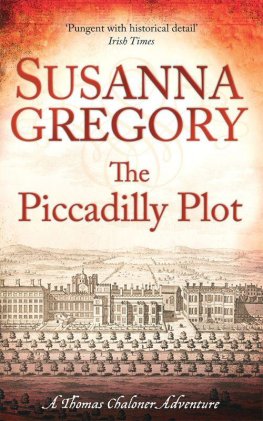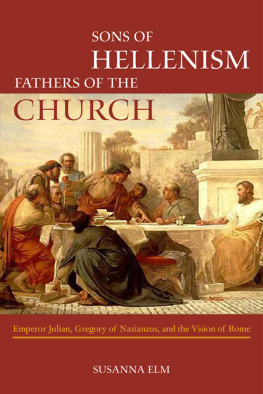Susanna Gregory - The Westminster Poisoner
Here you can read online Susanna Gregory - The Westminster Poisoner full text of the book (entire story) in english for free. Download pdf and epub, get meaning, cover and reviews about this ebook. year: 2010, publisher: Little, Brown Book Group, genre: Detective and thriller. Description of the work, (preface) as well as reviews are available. Best literature library LitArk.com created for fans of good reading and offers a wide selection of genres:
Romance novel
Science fiction
Adventure
Detective
Science
History
Home and family
Prose
Art
Politics
Computer
Non-fiction
Religion
Business
Children
Humor
Choose a favorite category and find really read worthwhile books. Enjoy immersion in the world of imagination, feel the emotions of the characters or learn something new for yourself, make an fascinating discovery.

- Book:The Westminster Poisoner
- Author:
- Publisher:Little, Brown Book Group
- Genre:
- Year:2010
- ISBN:9780748124558
- Rating:5 / 5
- Favourites:Add to favourites
- Your mark:
- 100
- 1
- 2
- 3
- 4
- 5
The Westminster Poisoner: summary, description and annotation
We offer to read an annotation, description, summary or preface (depends on what the author of the book "The Westminster Poisoner" wrote himself). If you haven't found the necessary information about the book — write in the comments, we will try to find it.
The Westminster Poisoner — read online for free the complete book (whole text) full work
Below is the text of the book, divided by pages. System saving the place of the last page read, allows you to conveniently read the book "The Westminster Poisoner" online for free, without having to search again every time where you left off. Put a bookmark, and you can go to the page where you finished reading at any time.
Font size:
Interval:
Bookmark:
Susanna Gregory
The Westminster Poisoner
Prologue
Threadneedle Street, London, October 1660
Henry Scobel, Clerk of the House of Lords, was dying. His physician had confidently informed him that he was afflicted with a sharpness of the blood, a painful ailment from which few recovered. Scobel had always lived a clean, decent and sober life, and had no idea why his blood should so suddenly have become sharp, but he was unwilling to waste his last hours pondering on it. He was a religious man, and if God had decided it was time for him to die, then who was he to argue? And, if the truth be told, he no longer had much appetite for life, anyway he had liked England under Cromwell, but detested it under the newly restored Charles II. The King and his Court had only been installed for a few months, but already they were showing themselves to be corrupt, debauched and treacherous. Scobel was appalled by them, and deplored the notion of such men ruling his country.
You will be better soon, uncle, said Will Symons, trying to control the tremor in his voice. He loved his kinsman dearly, and hated to see him suffering. And in the spring, we shall ride out together to see the cherry trees at Rotherhithe, just like we do every year.
Scobel was sorry to be the cause of his nephews distress: Symons was a good man, who was hard-working, honest and reliable, and Scobel thought it disgraceful that he had recently been ousted from his government post, just because the Royalists wanted it for one of their cronies. Of course, Symons was not the only one to be shabbily treated honourable men all over the country were facing hardship and ruin for no reason other than that they had worked for the Commonwealth. It made Scobel furious, especially as the newcomers were not only unqualified for the jobs they were being given, but many were brazenly corrupt, too.
Do not worry, said Symons kindly, when his uncle began to voice his concerns. Have you forgotten our last prayer meeting? Everyone promised swore sacred oaths to live righteous and godly lives, no matter how wicked the world becomes. Others will follow their example, and evil will never triumph.
Scobel was not so sure about that, but he summoned a smile when he thought of his friends. They are decent souls, but these are difficult times. It would not be the first time an upright man fell by the wayside, and I fear for their-
They are successful and happy, said Symons firmly, to quell the dying mans growing agitation. And they know it is Gods reward to them for being good. They also know He might take it all away again if they let themselves be seduced by sin. Do not fret, uncle: they will not stray.
Scobels expression was pained. But I do not want them to uphold their principles because they are afraid their luck will change if they transgress. I want them to do it because they love God and desire to do His will.
They will, said Symons soothingly. I will see they do.
Scobel closed his eyes wearily, and hoped the younger man was right. He could feel his life ebbing away faster now, and had no energy for debate. All he hoped was that his beloved country would survive the corruption that was taking hold in Westminster and White Hall, and that good people, like the men who attended his prayer meetings, would stand firm against sin and encourage others to do likewise. A tear rolled down his cheek when he thought about what might happen if they failed. Poor England! Would her suffering never end?
Westminster, Christmas Day 1663
The Palace of Westminster was an eerie place after dark. It was full of medieval carvings that gazed down from unexpected places, and when the lantern swayed in his hand, it made some of the statues look as though they were moving. The killer was sure he had just seen Edward the Confessor reach for his sword, while a few moments before he had been equally certain that a gargoyle had winked at him. He took a deep breath and tried to pull himself together, increasing his stride so he could complete his business and go home. It was no night to be out anyway, with a fierce storm blowing in from the east, carrying with it needles of rain that hurt when they hit bare skin.
He walked towards the building called the Painted Chamber, which was a long, draughty hall hung with tapestries so old they were grey with dust. Ancient kings had once used it to receive important guests; nowadays it was where the two Houses of Parliament met when they needed to confer. However, as Commons and Lords rarely had much to say to each other, a few high-ranking government officials had taken it over. Desks were placed at irregular intervals along its length, while around its edges were chests full of documents, writs and books.
The Painted Chamber was empty now, of course, because it was eight oclock on Christmas night, and the clerks had gone home early, eager to gorge themselves on rich seasonal foods, sing carols and enjoy visits from friends and family. Cromwells Puritans had done their best to curb the revelries associated with the Twelve Days of Christmas, but December was a dark, cold, dreary month, and people needed something to cheer themselves up the Puritans efforts had never had gained much support, and the Restoration had seen the festival revived in all its pagan glory. Christmas was more popular now than it had ever been.
The killer nodded to himself when he opened the Painted Chambers door and saw a lamp gleaming at the far end. Most clerks had gone home early: James Chetwynd was still at his desk, chin resting on his left hand while he wrote with his right. The killer did not blame the man Chetwynds kin were quite open about the fact that they cared nothing for him, and that they hoped he would die so they could inherit his money; he would have to be insane to want to spend Christmas with them. The killer took a deep breath, and supposed they were going to be rich sooner than they had anticipated, because tonight was going to be Chetwynds last on Earth.
He advanced stealthily. Chetwynd was engrossed in his papers, so certain he was safe inside the great hall that he did not once look up. The killer wondered if the clerk preferred the stillness of evening to the commotion of daylight hours if he was able to think more clearly when there were no distractions. Regardless, the killer was glad he was there, because what better place for a murder than a deserted room in a palace that had been all but abandoned for the night? It afforded both privacy and space, allowing him to take his time and ensure he left no clues behind him. His smug musings meant he did not concentrate on where he was going, and he stumbled over a loose floorboard, a sound that made Chetwynds head jerk up in surprise.
Is anyone there? the clerk called, peering into the darkness beyond the halo of light around his desk. Show yourself!
There was no fear in his voice he assumed anyone entering the Painted Chamber would be a friend, and did not for a moment imagine he might be in danger. The killer did not reply. He waited until Chetwynds attention drifted back to his documents, and then he made his move.
Chapter 1
Westminster, 27 December 1663
There was a belief, common among many folk, that an unusually high wind was a sign that a great person would die. Thomas Chaloner was not superstitious, but even he could not deny that it was the second time in as many days that a gale had descended on the nations capital with a terrifying savagery, and that an eminent man had died on each occasion. He would not have said James Chetwynd or Christopher Vine were great exactly, but they were high-ranking officials, and that alone was enough to attract the Lord Chancellors attention. And when the Lord Chancellor expressed an interest, it was Chaloners responsibility, as his spy, to provide him with information.
Font size:
Interval:
Bookmark:
Similar books «The Westminster Poisoner»
Look at similar books to The Westminster Poisoner. We have selected literature similar in name and meaning in the hope of providing readers with more options to find new, interesting, not yet read works.
Discussion, reviews of the book The Westminster Poisoner and just readers' own opinions. Leave your comments, write what you think about the work, its meaning or the main characters. Specify what exactly you liked and what you didn't like, and why you think so.


